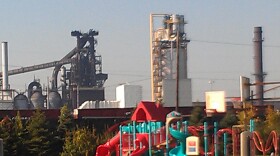This week, the Michigan Department of Environmental Quality issued updated permits for two of Michigan’s biggest polluters.
The Severstal steel plant in Dearborn and the Marathon oil refinery in southwest Detroit are some of the biggest industrial facilities in the state.
Both have failed to comply with their state air quality permits. Marathon has had a handful of past environmental violations. Severstal's record is worse—they’ve been cited 38 times in five years for violating their state permit.
Yet the state has let both Severstal and Marathon “revise” those permits, and agreed to loosen restrictions on some types of emissions.
That process has raised some concerns about how the state regulates polluters.
Michigan Radio’s Sarah Cwiek has looked into some of those concerns, and I spoke with her for today's Environment Report.
What do these revisions mean?
"Different things for the two facilities, but the basic idea is that the DEQ loosened some of the standards that they had to meet. In Marathon’s case, the 'revised' permit actually decreases emissions overall. But it raises the emissions cap for some specific pollutants.
In Severstal’s case, the state has relaxed standards on some toxic emissions like mercury and sulfur dioxide, and lead. This means that emissions levels that would have violated their old permit are now legal," says Cwiek.
Cwiek spoke with Lynn Feidler, with the DEQ’s air quality division, and she says this new permit sets more realistic standards.
"The company is first asked, can you comply with your existing emission limits? That is always our first discussion with them. And in both cases, they indicated they could not comply. And now we are working to make sure they have a permit that reflects their operations," says Feidler.
Influence from the MEDC?
There have also been questions raised about the role the Michigan Economic Development Corporation played in the Severstal permitting process. A Detroit Free Press investigation brought this to light last week.
Sarah Cwiek says back in 2012, Governor Snyder and the head of the MEDC attended a Severstal event. They apparently talked with the plant manager, who pushed for some new rules to be “grandfathered” in under the existing permit.
"An environmental law firm recently got ahold of some emails that showed that after that visit, the MEDC got involved in the permitting process, and seemed to be trying to steer it in Severstal’s favor," Cwiek says.
Nick Schroeck with the Great Lakes Environmental Law Center calls that 'really extraordinary':
"Having an economic development arm of the state government, the MEDC, intervening in a permitting action, and basically telling our regulators what to do," says Schroeck.
But, says Sarah Cwiek, "DEQ officials have told me that’s not a fair interpretation. They say they get a lot of input from different people and interest groups during the permitting process, and all the permits comply with overriding state and federal standards."
So now that these permits have been updated, is it the end of the story?
"In Marathon’s case, it probably is. The company is set to sign an agreement with state and federal agencies to resolve their past violations.
It’s less clear with Severstal. The state and the federal government are still pursuing enforcement actions there. When those emails came to light, State Representative Rashida Tlaib called the state permitting process “tainted,” and called for the EPA to basically take over monitoring and enforcement. And she urged community members to keep watching the plant and document what they see.
'If you smell anything, you see anything…you use your cameras, you take pictures. Don’t just talk to each other about it, you take pictures,' Tlaib says.
A key thing to remember is that these communities have some of the most, if not the most air pollution in the state. So residents already keep a close eye on these industries. We’ll have to see whether the EPA decides to get more involved," Cwiek says.
CORRECTION: The initial version of this story stated that the revised permit allows Severstal to emit 725 times more lead. That is incorrect. According to the Michigan Department of Environmental Quality, it can now emit 74 times more lead.










